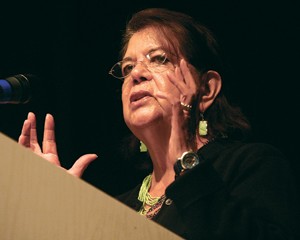Nearly 300 people filled the seats of Gallagher Theater last night when Wilma Mankiller, former Principle Chief of the Cherokee Nation, lectured on “”What it means to be an indigenous person in the 21st Century: A Cherokee woman’s perspective.””
Mankiller lectured on the current conditions of many indigenous peoples, both of the Americas and the rest of the world.
“”There are over 300 million indigenous people in countries all over the world, including China, South Africa, Latin America, Mexico and, of course, this land we call America,”” Mankiller said. “”Indigenous people have the unique benefit of ceremonies that remind them of the connection they have with their land. There is too little educational access to indigenous people, and information that is available is often produced by non-native people.””
Issues that generated the most applause from the audience concerned abolishing American Indian stereotypes and the realizing of American Indian distinction and influence within the United States.
Mankiller spoke of ways that American Indians can understand conditions for indigenous people and ways to bring misconceptions to an end.
“”To me, being an indigenous person in the 21st century means being a part of a community that faces daunting problems and oppression,”” Mankiller said. “”We need to forgo the feeling of anger in our hearts and to not be paralyzed by the injustices we see.””
Many of the audience members were students of the university, drawn to Mankiller’s lecture because of her esteemed status, they said.
“”She is a great leader, not only for her nation, but for all American Indians,”” said Chental Spencer, a history junior. “”She is a prime example of what native people can become. She defined what it means to be an indigenous woman.””
Spencer, like many other students, came to see Mankiller because of her own background as an American Indian. Other students, however, were drawn to the lecture not because of an American Indian background, but because of an interest in American Indian courses at the university.
“”I came here because of a class that I am in,”” said Weston Westenborg, a sociology junior. “”But she is an incredible speaker, and quite the leader. I myself am not American Indian, but she is definitely an inspiring person, regardless of background.
“”A lot of the things she spoke about can be applied to all oppressed people,”” Westenborg said. “”She is an American Indian, but I think she is more than that too.””
Mankiller is the recipient of 18 doctorate degrees from several universities and colleges, and has been inducted into multiple halls of fame, including the National Hall of Fame, the International Hall of Fame and the Oklahoma Hall of Fame.
Wilma Mankiller came to the UA from her home in Oklahoma as part of the Vine Deloria Jr. Distinguished Indigenous Scholar Series, to lecture on the problems and issues indigenous people face in contemporary society.
“”She is a preeminent thinker, a preeminent author and a preeminent activist,”” said K. Tsianina Lomawaima, head of the American Indian Studies department. “”She is truly a community activist. And we hope that this will be a life-long series.””
Mankiller was introduced by Lomawaima and professor Tom Holm of American Indian Studies, with much praise for her role in the Cherokee community.
“”She is the first female chief (of the Cherokee Nation),”” Holm said. “”She is the first in a lot of things.””
The American Indian Studies department will be offering more lectures this semester sponsored by the Vine Deloria Jr. Distinguished Indigenous Scholars Series, including lectures by Dr. Richard Allen and Dr. David E. Wilkins.
“”Land can be colonized, and resources can be colonized,”” Mankiller warned. “”But dreams can never be colonized. We must articulate on our vision of the future.””









